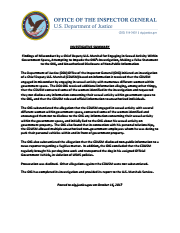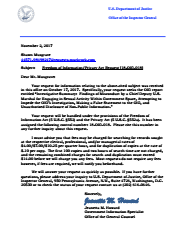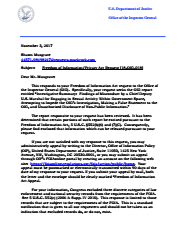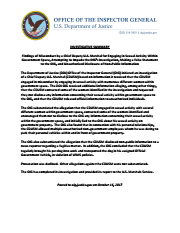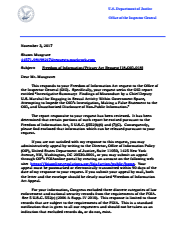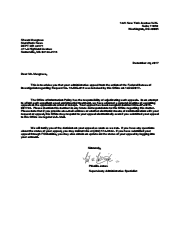Investigative findings report re: CDUSM, sexual activity, leaks, dogs (Oct 2017)
| Tracking # |
18-OIG-018, DOJ-AP-2018-001748 |
| Submitted | Oct. 17, 2017 |
| Est. Completion | None |
MuckRock users can file, duplicate, track, and share public records requests like this one. Learn more.
Communications
From: Shawn Musgrave
To Whom It May Concern:
This is a request under the Freedom of Information Act. I hereby request the following records:
A copy of the investigative findings report provided by the DOJ OIG to the USMS regarding alleged impropriety by a Chief Deputy U.S. Marshal (CDUSM), particularly allegations that the CDUSM engaged in misconduct by engaging in sexual activity with numerous different women within government space.
Attached is a public summary, dated October 16, 2017 of findings regarding this particular investigation. According to the summary: "The OIG has completed its investigation and provided its report to the U.S. Marshals Service."
In the event that there are fees, I would be grateful if you would inform me of the total charges in advance of fulfilling my request. I would prefer the request filled electronically, by e-mail attachment if available or CD-ROM if not.
Thank you in advance for your anticipated cooperation in this matter. I look forward to receiving your response to this request within 20 business days, as the statute requires.
Sincerely,
Shawn Musgrave
From: Department of Justice, Office of the Inspector General
Hello:
Attached is the OIG's acknowledgement to your FOIA request.
Thanks.
-

~WRD000
From: Department of Justice, Office of the Inspector General
Hello:
Attached is the OIG's response to your FOIA request.
Thanks.
From: Shawn Musgrave
To Whom It May Concern:
I hereby appeal the extensive redaction of documents provided to me in response to this FOIA request, which the DOJ OIG FOIA team assigned tracking number 18-OIG-018.
On October 17, 2017, I requested the following documents under the Freedom of Information Act from the DOJ OIG ("the agency" below):
A copy of the investigative findings report provided by the DOJ OIG to the USMS regarding alleged impropriety by a Chief Deputy U.S. Marshal (CDUSM), particularly allegations that the CDUSM engaged in misconduct by engaging in sexual activity with numerous different women within government space.
To aid in processing my request, I provided the attached public summary of the findings regarding this particular investigation. This public summary, which did not name the individual against whom misconduct findings were substantiated, is also available online here: https://oig.justice.gov/reports/2017/f171016.pdf
On November 3, 2017, DOJ OIG provided a heavily redacted copy of the "REPORT OF INVESTIGATION," a copy of which is also attached along with the response letter. In its response letter, the DOJ OIG's FOIA office justified extensive redactions as follows: "It has been determined that certain portions of such report be excised pursuant to the Freedom of Information Act, 5 U.S.C. §552(b)(6) and (7)(C)."
Foremost, the agency's response did not outline any way in which release of these records might foreseeably harm the agency's interests, as required by the "foreseeable harm" standard established in the 2016 revisions to the FOIA statute. Even if the cited exemptions might apply, this standard directs the disclosure of the requested document if an agency cannot determine a reasonable harm in such disclosure. I ask that this request be remanded to the agency for additional review under a foreseeable harm analysis, and explicit articulation of the determination as to foreseeable harm.
Second, the agency did not indicate which redactions corresponded to which invoked exemption. Without this information, it is incredibly difficult to rebut the application of a particular redaction to a particular portion of the provided documents.
Third, the agency failed to sufficiently elaborate how the cited exemptions apply in any way to the documents at hand. Exemptions to the FOIA must be applied specifically and narrowly, rather than invoked in a blanket fashion. Here, the agency merely cited the statutory exemption without any explicit or specific justification. This does not fulfill the agency's obligations under the statute.
Fourth, the agency failed to sufficiently justify the redaction of entire paragraphs in key sections of the report. Where possible, an agency must redact portions of a document. The DOJ OIG FOIA team did this in some sections. But in the section addressing substantiated misconduct as to unauthorized disclosure of information, several paragraphs are withheld in their entirety, rather than redacted at the word or sentence level.
Fifth, the invoked exemptions are inadequate to justify redaction of certain information that simply does not fall under either exemption b(6) for personal information or exemption b(7)C for personal information in law enforcement records. As one example, I would point to the redaction of the case number from the every page of the investigative report. It is difficult to characterize such mundane information as a report number to be personal information subject to redaction. If previously published reports offer any insight into the format of such numbers, this case number is formatted along the lines of "2014-007805," i.e, "YYYY-######," without any personally identifying information at all. Similarly, the DOJ OIG FOIA team redacted entire entries describing materials reviewed as part of the investigative process (see "Review of the following" on page 5 of 14 in the report). The redaction of such objectively non-personal information casts a general doubt that the agency applied appropriate analysis in redacting other information in the report.
Sixth, and perhaps most importantly, the invoked exemptions are inadequate to justify withholding of the investigation subject's name and related identifying information when balanced against the public interest in knowing the individual's identity. Even beyond the agency's failure to articulate ANY explicit justification under the personal privacy exemptions, the agency has further failed to meet its burden to prove that the individual has a substantive privacy interest, or that such interest outweighs the public's interest in such information.
In the investigative subject has ANY privacy interest pertinent to the requested documents, such interest is minimal. Through secondary sources and extensive reporting, I have identified the subject as Jon Murray, former Chief Deputy in the District of Massachusetts. (See my November 13, 2017 article in the Boston Globe, "Top US marshal allegedly lied under oath about sex in government office," available online at http://www.bostonglobe.com/metro/2017/11/12/misdeeds-alleged-against-marshal/uKZX3z0eborA0XtwZZrmaJ/story.html.) Such public identification — corroborated by extensive documentation — arguably disqualifies any argument that there is any substantive privacy interest to consider with regard to the present investigative report into Murray's substantiated misconduct. This accords with case law holding that "the interests in privacy fade when the information involved already appears on the public record" (Cox Broadcasting Corp. v. Cohn, 420 U.S. 469 at 494(1975)). The Supreme Court cited this holding in DOJ v. Reporters Comm. for Free Press (1989), reiterating that "the extent of the protection accorded a privacy right at common law rested in part on the degree of dissemination of the allegedly private fact and the extent to which the passage of time rendered it private," 489 U.S. 749 at 763 (see also footnote 15). Case law also supports an argument that Murray's status as a high-ranking official — the chief deputy marshal in the District of Massachusetts, i.e., the second from the top in that district — further diminishes his privacy interest in the information contained in the investigative report summarizing substantiated misconduct findings. In short, there is no substantive privacy interest by which the agency can justify withholding as much information as it has.
Even if one considers Murray to still have a privacy interest in the present documents, it is indisputably outweighed by the public interest in disclosure of the information contained in this report. The public interest in such disclosure is overwhelming, as demonstrated not only by the misconduct findings against a high-ranking official — information about which the public has an interest as taxpayers and constituents of the government — but also by the way in which the agency itself dealt with such findings.
The redacted report indicates that the OIG substantiated that the misconduct constituted criminal violations. The OIG passed along its findings to the Justice Department's Public Integrity Section. Although prosecutors declined to file charges, the OIG's findings of administrative misconduct as well as criminal violations together heighten the public interest in disclosure of the full report, including the identity of the investigative subject. These findings implicate a high-ranking official for obstruction of justice and witness tampering. The public has an indisputable interest in knowing the full details of such criminal violations, as well as the identity of who committed them (and, implicitly, those who did not commit them, i.e., the more than 90 other chief deputy marshals across the country whose actions were not subject to investigation).
The OIG itself demonstrated the public interest in information regarding these findings by issuing a public press release. Press releases issued by an agency demonstrate the agency's perception that the information contained therein has value for the public. For the agency to argue that extensive portions of the report — including the identity of the official — is disqualified from publication is directly contradicted by the agency's practice in issuing such a release. That contradiction is heightened here by the fact that the OIG review identified criminal violations.
This intense public interest far outweighs any minimal privacy interest Murray holds in this investigative report. As articulated in Perlman v. DOJ (2002), pertinent factors in balancing a government employee's privacy interests against the public's interest in disclosure include, among others:
(1) the government employee's rank;
(2) the degree of wrongdoing and strength of evidence against the employee;
(3) whether there are other ways to obtain the information;
(4) whether the information sought sheds light on a government activity; and
(5) whether the information sought is related to job function or is of a personal nature. (312 F.3d 100 at 107).
Each of the above factors further bolster the case for disclosing the investigative report in full, including the name of the investigative subject. As to rank, Mr. Murray was a chief deputy marshal — again, the second-in-command of the District of Massachusetts for the US Marshal Service. Again, the OIG's press release itself speaks to Murray's high rank: its policy is to issue investigative summaries for findings of misconduct against high-ranking officials.
As to the degree of wrongdoing and strength of evidence: the redacted report substantiated criminal violations, and not mere misconduct. These criminal violations included twice lying under oath and attempting to dissuade witnesses from cooperating with government investigators.
As to whether there are other ways to obtain the information: the OIG is the sole agency which holds the requested report.
As to whether the information sought sheds light on a government activity: this is an inherently governmental activity, namely the investigation of a high-ranking government official.
Finally, as to whether the information sought is related to job function or is of a personal nature: while the substantiated misconduct included several findings of deeply personal issues — namely, sexual activity — the fact that such sexual activity not only took place on government property and subsequently resulted in Mr. Murray's lying twice under oath clearly demonstrates that the requested information pertains to matters reflecting on Mr. Murray's job function.
In light of the above, as well as any other reasons you might consider pertinent to my appeal, I ask that you remand this request back to the DOJ OIG FOIA office for good faith processing and release of the requested report in full.
Respectfully,
Shawn Musgrave
From: Department of Justice, Office of the Inspector General
01/04/2018 03:04 PM FOIA Request: DOJ-AP-2018-001748
Files
pages
